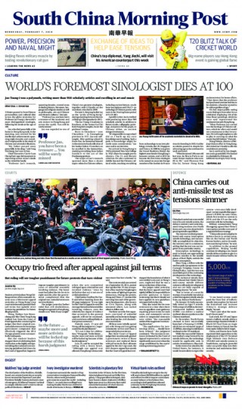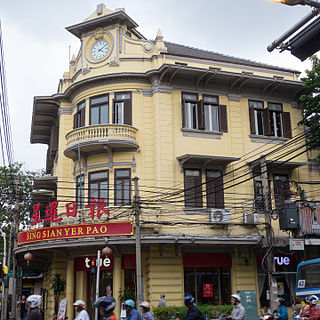Related Research Articles

Wah Yan College Kowloon is a Catholic secondary school for boys run by the Chinese Province of the Society of Jesus. It is located in Kowloon, Hong Kong and is a grant-in-aid secondary school using English as the primary medium of instruction. The total land area of its campus is among the largest for Hong Kong secondary schools, and it's one of the most prestigious schools in Hong Kong.

The Hong Kong Economic Journal (HKEJ). is a Chinese-language daily newspaper published in Hong Kong by the Hong Kong Economic Journal Co., Ltd.. Available in both Hong Kong and Macau, the newspaper mainly focuses on economic news and other related, usually political issues. The newsjournal is also available to some air passengers – those travelling to the United States, Canada, and Europe. It is authorised by the Hong Kong government to publish announcements related to some law issues.

Chen ( ) is a common Chinese-language surname and one of the most common surnames in Asia. It is the most common surname in Taiwan (2010) and Singapore (2000). Chen is also the most common family name in Guangdong, Zhejiang, Fujian, Macau, and Hong Kong. It is the most common surname in Xiamen, the ancestral hometown of many overseas Hoklo.
The Hong Kong Commercial Daily (HKCD) is a Chinese state-owned newspaper, published in broadsheet format in Hong Kong and dubbed “China’s international media window” by the central government. Established in 1952, it was the first financial newspaper in the Chinese language. It is one of the few newspapers authorized by the Hong Kong SAR government to publicize legal announcements, and also the only Hong Kong newspaper allowed to be circulated freely in mainland China. It is controlled by the Hong Kong Liaison Office and has a branch office in Shenzhen.

Tan Sri Loke Wan Tho was a Malaysian-Singaporean business magnate, ornithologist, and photographer. He was the founder of Cathay Organisation in Singapore and Malaysia, and Motion Picture and General Investments Limited (MP&GI) in Hong Kong.

Ye is a Chinese-language surname. It is listed 257th in the Song dynasty classic text Hundred Family Surnames, and is the 43rd most common surname in China, with a population of 5.8 million as of 2008 and 2019. Ye is usually romanized as "Yeh" in Taiwan based on Wade-Giles; "Yip", "Ip", "Jip" and "Yeap" in Cantonese; "Iap", "Yap", "Yapp", and "Yiapp" in Hakka and Hokkien.

Nanyang Siang Pau or Nanyang Business Daily was founded by philanthropist-entrepreneur Tan Kah Kee on 6 September 1923 in Straits Settlements, currently published in Malaysia. Nanyang Siang Pau is one of the oldest Chinese-language newspapers in the country, with only Kwong Wah Yit Poh having been published longer. It has been published continuously except for four months in 1923 and 1924 and during the World War II between 1942 and 1945, before publication resumed on 8 September 1945.
Nanyang Siang Pau was a newspaper in Singapore that was founded by philanthropist-entrepreneur Tan Kah Kee on 6 September 1923. It had a circulation across the Straits Settlement.

The South China Morning Post (SCMP), with its Sunday edition, the Sunday Morning Post, is a Hong Kong-based English-language newspaper owned by Alibaba Group. Founded in 1903 by Tse Tsan-tai and Alfred Cunningham, it has remained Hong Kong's newspaper of record since British colonial rule. Editor-in-chief Tammy Tam succeeded Wang Xiangwei in 2016. The SCMP prints paper editions in Hong Kong and operates an online news website that is blocked in mainland China.

Boxer's Adventure, also released as The Boxer's of Shaolin, is a 1977 Taiwan martial arts action film starring Tao-liang Tan and Jack Lung Sai-Ga.

Lianhe Wanbao was a Singapore Chinese afternoon newspaper published daily by SPH Media from 16 March 1983 after the merger between Nanyang Siang Pau and Sin Chew Jit Poh.

Lat Pau was one of the earliest Chinese-language newspapers published in Singapore. It was first published in December 1881 by See Ewe Lay under Lat Pau Press Ltd. It was published for 52 years, ending in March 1932. It was it the longest-running local-run Chinese newspaper before World War II.
Yeng Pway Ngon was a Singaporean poet, novelist and critic in the Chinese literary scene in Singapore, Malaysia, Hong Kong and Taiwan.

Sing Sian Yer Pao Daily News formerly Sing Sian Yer Pao is a Thai newspaper that is published in Chinese language. It was founded by millionaire Aw Boon Haw, a Chinese Hakka diaspora, as a sister newspaper of the "Star Newspapers" in Singapore, Malaysia and Hong Kong as well as other locations. However, by ownership, they are currently not related; sister newspapers of Sing Sian Yer Pao currently is the publication by Nanfang Media Group of the People's Republic of China.
See Ewe Lay, alternatively spelled Seet Ewe Lay, was a descendant of the wealthy Peranakan See clan and the founder of Lat Pau, the first major Chinese newspaper in Singapore.
See Hoot Kee, alternatively spelled See Hoot Keh, See Hood Kee or Si Hoo Keh, was a prominent leader and pioneer in the Hokkien community in Singapore.
Chong Shing Yit Pao, was a Chinese-language newspaper in Singapore. The newspaper was founded in 1907 by Tongmenghui members in response to the growing influence of The Union Times, a paper which they had founded but had fallen under the control of reformists.
Sing Po, was a Chinese-language newspaper in Singapore. The newspaper was the second Chinese-language daily newspaper in Singapore, after Lat Pau. The newspaper closed down in 1898 was replaced by the Jit Shin Pao a year later.

Teo Eng Hock was a rubber tycoon and the founder of the Singaporean branch of the Tongmenghui and later the Kuomintang. He later moved to China and became involved in politics there.
References
- 1 2 3 4 5 衣若芬 (2017). 同济医院150周年文集 (1867-2017). pp. 206–213. ISBN 9811139431.
- 1 2 3 4 Tan, Ban Huat (16 September 1977). "Chinese newspaper pioneer in Southeast Asia -Mr. Yeh Chi-yun". The Straits Times . Singapore. Retrieved 17 July 2022.
- 1 2 3 4 "Yeh Chi Yun". Reference@NLB. Singapore. Retrieved 10 October 2022.
- 1 2 3 Wang, Bing (2017). Classical Chinese Poetry in Singapore: Witnesses to Social and Cultural Transformations in the Chinese Community. World Scientific. p. 59. ISBN 149853516X.
- ↑ Chong, Guang Kwa; Bak, Lim Kua (2019). A General History Of The Chinese In Singapore. World Scientific. pp. 390–391. ISBN 9813277653.